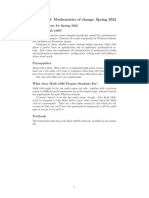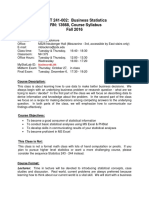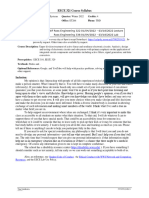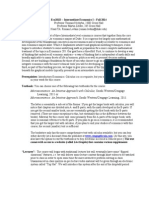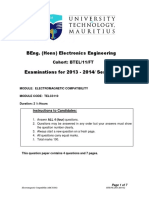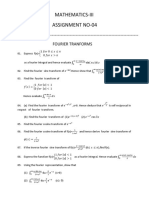0 ratings0% found this document useful (0 votes)
260 viewsMulti Syllabus
This document provides information about the EGR/MAT/PHY192 integrated engineering, mathematics and physics course for fall 2014. It outlines the instructors, Antonio Aché and John Stogin, and grader, Tomoaki Yasukawa. The course combines material from physics and calculus courses, covering topics like vector calculus, differential equations, and multiple integrals. It describes the organization of the course including lectures, problem sets, quizzes, exams and office hours for getting help. The grading breakdown and preliminary schedule are also included.
Uploaded by
Julia YuCopyright
© © All Rights Reserved
Available Formats
Download as PDF, TXT or read online on Scribd
0 ratings0% found this document useful (0 votes)
260 viewsMulti Syllabus
This document provides information about the EGR/MAT/PHY192 integrated engineering, mathematics and physics course for fall 2014. It outlines the instructors, Antonio Aché and John Stogin, and grader, Tomoaki Yasukawa. The course combines material from physics and calculus courses, covering topics like vector calculus, differential equations, and multiple integrals. It describes the organization of the course including lectures, problem sets, quizzes, exams and office hours for getting help. The grading breakdown and preliminary schedule are also included.
Uploaded by
Julia YuCopyright
© © All Rights Reserved
Available Formats
Download as PDF, TXT or read online on Scribd
You are on page 1/ 5
EGR/MAT/PHY192 Fall 2014
An Integrated Introduction to Engineering,
Mathematics, Physics
Instructors:
Antonio Ache
Oce: Fine 607
Phone: 609-258-4235
Email: aache@math.princeton.edu
John Stogin
Oce: Fine 906
Phone: 609-258-4198
Email: jstogin@math.princeton.edu
Grader:
Tomoaki Yasukawa
Email: yasukawa@princeton.edu
General Information: This course constitutes the math portion of the EGR
/MAT/PHY191-192 (which we will refer to as EMP) sequence designed for engineer-
ing students, which combines the material of PHY103 (General Physics: Mechanics
and Thermodynamics) and MAT201 (Multivariable Calculus) but with an emphasis
on applications to engineering.
We will cover (most of) Chapter 12-16 of the text, Thomas Calculus customized
for Princeton University, Vol. 2. Topics include: vector calculus, partial deriva-
tives and matrices, line integrals, simple dierential equations, surface and volume
integrals, Greens, Stokes and divergence theorems.
The math part of EMP has two goals. First, it wants to explain all the mathemat-
ical techniques required by the physics part of the course. It will sometimes do this
in a more rigorous way than the physics textbook, which will make the derivations
1
easier to generalize to other situations. It will also not quite follow the order in which
topics generally appear in math textbooks, because we want you to understand the
mathematical techniques needed in physics by the time you need them. The second
goal is to show that mathematics is the language of choice for many scientic and
engineering problems: it enables us to formulate, think about, and solve the essence
of a technical problem. In doing so, it makes us develop tools that are more widely
applicable and are therefore more useful to keep at hand in our toolbox. In later
engineering courses, you will be expected to have these tools at your nger tips.
Course Webpage: Log in at http : //blackboard.princeton.edu/ and go to
EGR192 MAT192 F2014.
Check this website regularly for updates, review material, exam dates, e.t.c. All
course related information will be done through this website.
Course Organization: EMP covers a lot of challenging material in a short amount
of time. Each weeks material builds on the previous weeks. The only way for you to
handle this is to keep up. We have imposed a lot of structure on the course to guide
you.
There will be 3 lectures per week and classes will be highly interactive, you must
be prepared. Over the weekend, you should work on the weekly problem set and
identify what you may need help with at the problem sessions on Monday evening.
You turn in your problem set at the beginning of each Wednesday lecture.
Dont wait till Monday evening to start on your problem set! Ask questions if
anything is unclear, and do not hesitate to come to your instructors or graders oce
hours if you need help. Remember that mathematics is learned mostly by working
on problems. We will do our best to help you, but it is your participation that makes
all the dierence.
Oce Hours: In oce hours, you can get your questions answered and get one-on-
one help with problem solving. The rst thing to learn is not to be intimidated - we
are eager to have you attend oce hours. The initial posted schedule is preliminary.
As we learn what works best, we will make adjustments - feel free to make suggestions.
If your schedule keeps you away from oce hours, let us know. We can either adjust
the schedule or make separate appointment with you.
When you come to oce hours, dont expect the instructor to stand at the board
and show you how to do problems. Rather, the instructor will ask you to do the
problem. By watching you struggle with the problem, the instructor can see what it
is you are missing, and coax the solution out of you. Though this can be disconcert-
ing at rst, nding the solution yourself with our help is vastly better than having
it shown to you.
Problem Sessions: There will be problem sessions held on Monday evenings from
7:30 PM-9:30 PM at the round tables outside Fine library. The problem sessions are
optional, but if they are working, most of the class will be there. At the sessions,
you will work in groups of six or so, with the teaching sta circulating around and
helping out. We will not show you how to do the problems explicitly, but we will
give you guidance that will allow you to do them.
We have found that the problem sessions are an eective way for you to develop
problem-solving skills, but there are certain features of this system that you must be
aware of. First, though we are happy to have you work together solving problems,
the majority of the grade in the course depends on exams and quizzes: you must
ultimately be able to do the problems yourself. The best approach is to start the
problem set yourself or with a buddy early in the week, do what you can, and use
instructors oce hours and the problem session to get the rest. If you feel that
you are too dependent on others at the problem session, try depending more on
oce hours, where you will get more individual attention. If you choose not to go
to the problem sessions, you should realize that, by working at the sessions, most
students turn in problem sets that are essentially complete. Doing half of it by your-
self is not better than doing all of it with help - nd some way to do all the problems.
Problem Sets: Problem sets will be assigned, collected, and graded each week. All
problem sets will be posted on the Blackboard site under Assignments, and they
will be due on Wednesday at the start of the lecture. Solutions will be posted on
Blackboard as well. Late homework will not be accepted unless you have a note from
McCosh Health Center or your college dean. You are encouraged to work together
with your classmates on the problem sets, but you must write up your own solu-
tion. Please staple all pages of your homework together, write clearly in sentences,
circle your answers whenever appropriate, write your name legible on your paper,
and record the names of your collaborator(s). You may lose points for unstapled or
unclear work. Keep in mind that simply copying solutions from another student or
from the solution manual is a waste of everybodys time, as well as a violation of the
expected standard of academic integrity.
Problem set due dates are: Sep. 17, 24; Oct. 1, 8, 15, 22; Nov. 12, 19; Dec. 3, Dec.
10; Jan. 7.
Quizzes: There will be three 20-minute in-class quizzes on September 17, Oc-
tober 8 and December 3. The quiz for September 17 will be a placement or
diagnostic quiz and its grade will not count towards the total quiz grade but it will
be mandatory nonetheless. If you absolutely must miss a quiz due to a serious ill-
ness, religious holiday, or a university sanctioned trip, you must discuss this with
your instructor in a timely manner, before the quiz if possible. Otherwise, you will
receive no credit for a missed quiz. You may be asked to provide a note from your
doctor or from an academic ocial.
Midterm and Final Exams: Midterms and nals from past semesters will be avail-
able on blackboard under Exams. Both sections will take the same exam at a time
scheduled by the registrar during Midterm/Final Week. The exact date and other
details will be posted on blackboard as soon as the Registrars oce sets the schedule.
Grading: The course grade will be determined according to your performance on
homework (15%), quizzes (20%), midterm exam (25%), and nal exam (40%).
Frist Study Halls: The McGraw Center runs the McGraw study halls at Frist
Campus center, where they provide free tutoring and space for doing work with fel-
low students (the center is staed by students). You can nd more information at
http://www.princeton.edu/mcgraw/
Course Calendar: This is a preliminary schedule which may be adjusted as pacing
requires. Numbered chapters and sections refer to Thomas Calculus. For more
detail, see the homework assignments.
Week Dates Topics to Be Covered
0-1 9/10-9/19 (Quiz 1 on 9/17) Vectors and the Geometry of Space
Sections 12.1 12.6
2 9/22-9/26 Vector-Valued Functions and Motion in
Space
Sections 11.3, 15.7, 13.1, 13.3, 16.1
3 9/29-10/03 Ordinary Dierential Equations
ODE Textbooklet
4 10/6-10/10 (Quiz 2 on 10/08) Ordinary Dierential Equations, Functions
of Several Variables
ODE Textbooklet, Sections 14.1, 15.1
5 10/13-10/17 Multiple Integrals
Sections 15.2 15.6
6 10/20-10/24 Review, Triple Integral in Cylindrical and
Spherical Coordinates
(Midterm on 10/22) Section 15.7
7 11/3-11/7 Partial Derivatives, Substitution in Multiple
Integral, Chain Rule
Sections 14.3, 15.8, 14.4
8 11/10-11/14 Directional Derivatives, Tangent Planes, Lin-
ear Approximations, and Optimization
Sections 14.5 14.7
9 11/17-11/21 Lagrange Multipliers, Taylors Approxima-
tion, Vector Fields
Sections 14.8 14.9, 16.1
10 11/24 Line Integrals
Sections 16.2
11 12/1 -12/5(Quiz 3 on 12/3) Conservative Fields, Greens Theorem,
Parametrized Surfaces
Sections 16.3 16.5
12 12/8-12/12 Flux Integrals, Stokes Theorem, and the Di-
vergence Theorem
Sections 16.6 16.8
You might also like
- Spring 2020 PHYS 224 Vibrations and WavesNo ratings yetSpring 2020 PHYS 224 Vibrations and Waves6 pages
- Physics of Vibrations and Waves: PHYS 224 Spring 2018No ratings yetPhysics of Vibrations and Waves: PHYS 224 Spring 20185 pages
- Accelerated Introduction To Statistical Methods (Syllabus)No ratings yetAccelerated Introduction To Statistical Methods (Syllabus)3 pages
- FE 610 Probability and Stochastic Processes For Finance: ObjectivesNo ratings yetFE 610 Probability and Stochastic Processes For Finance: Objectives5 pages
- Linear, Quadratic, Exponential, Logarithmic, Trigonometric, Polynomial and Rational Functions Will Be DiscussedNo ratings yetLinear, Quadratic, Exponential, Logarithmic, Trigonometric, Polynomial and Rational Functions Will Be Discussed8 pages
- Mathematics 411 Autumn 2005: Introduction To Modern Algebra For TeachersNo ratings yetMathematics 411 Autumn 2005: Introduction To Modern Algebra For Teachers4 pages
- ECE 201 Introduction To Signals and Systems: CRN #80681 Fall 2017 SyllabusNo ratings yetECE 201 Introduction To Signals and Systems: CRN #80681 Fall 2017 Syllabus5 pages
- Econ 332 Economic Analysis of Labor Markets: Case Western Reserve UniversityNo ratings yetEcon 332 Economic Analysis of Labor Markets: Case Western Reserve University3 pages
- STAT 241 Syllabus (Fall 2016) Mark Blackmore Portland State University Business StatisticsNo ratings yetSTAT 241 Syllabus (Fall 2016) Mark Blackmore Portland State University Business Statistics6 pages
- Introduction Machine Learning and Pattern RecognitionNo ratings yetIntroduction Machine Learning and Pattern Recognition3 pages
- AM/ECON 11B, Fall 2019. MWF 2:40 - 3:45 PM, Earth&Marine B206 CanvasNo ratings yetAM/ECON 11B, Fall 2019. MWF 2:40 - 3:45 PM, Earth&Marine B206 Canvas6 pages
- Syllabus. Developmental Math 011 - Spanish - FALL 22No ratings yetSyllabus. Developmental Math 011 - Spanish - FALL 224 pages
- SYLLABUS: CHE 100 - Chemical Processes, FALL 2015: Yitang@ucla - EduNo ratings yetSYLLABUS: CHE 100 - Chemical Processes, FALL 2015: Yitang@ucla - Edu6 pages
- Syllabus: Foundations of Finance Fall Semester 2009-2010 B01.2311.10No ratings yetSyllabus: Foundations of Finance Fall Semester 2009-2010 B01.2311.107 pages
- TEST TAKING STRATEGIES FOR EVERYONE: A Comprehensive Guide to Mastering Test Taking (2023 Beginner Crash Course)From EverandTEST TAKING STRATEGIES FOR EVERYONE: A Comprehensive Guide to Mastering Test Taking (2023 Beginner Crash Course)No ratings yet
- Advanced Finite Element Analysis Using ANSYS Mechanical APDLNo ratings yetAdvanced Finite Element Analysis Using ANSYS Mechanical APDL3 pages
- Expt - 1 - Verification of Superposition Theorem For Ac Circuits100% (1)Expt - 1 - Verification of Superposition Theorem For Ac Circuits3 pages
- 1986 - (Ashtekar) New Variables For Classical and Quantum GravityNo ratings yet1986 - (Ashtekar) New Variables For Classical and Quantum Gravity4 pages
- Exo Endothermic BA and Its Foaming BehaviourNo ratings yetExo Endothermic BA and Its Foaming Behaviour11 pages
- Current, Resistance and Electromotive ForceNo ratings yetCurrent, Resistance and Electromotive Force20 pages
- Calculation of Load Carrying Capacity of Pile (Al)No ratings yetCalculation of Load Carrying Capacity of Pile (Al)26 pages
- Theoretical Determination of X Theory Shows That X X̄No ratings yetTheoretical Determination of X Theory Shows That X X̄3 pages
- Civil Engineering Fluids Statics DynamicsNo ratings yetCivil Engineering Fluids Statics Dynamics1 page
- CHP.32 Coulombs - Law Worksheet 32.1 AnswersNo ratings yetCHP.32 Coulombs - Law Worksheet 32.1 Answers2 pages
- Post-Processing: Visualization, Sampling, and Plotting: Eric Paterson Egp@vt - EduNo ratings yetPost-Processing: Visualization, Sampling, and Plotting: Eric Paterson Egp@vt - Edu27 pages
- Pair By: Mechanics 2 Hour) Test 2 Answer QuestionsNo ratings yetPair By: Mechanics 2 Hour) Test 2 Answer Questions6 pages
- Resource 20240525092946 Ix Holiday HomeworkNo ratings yetResource 20240525092946 Ix Holiday Homework3 pages
- Esa Eso Hubble Space Telescope Educational Material - Hubble 15 Year of Discovery (English) Series 0.1 - BookNo ratings yetEsa Eso Hubble Space Telescope Educational Material - Hubble 15 Year of Discovery (English) Series 0.1 - Book22 pages
- The Warping Torsion Bar Model of The Differential Quadrature MethodNo ratings yetThe Warping Torsion Bar Model of The Differential Quadrature Method9 pages
- Wireless Telephony - Fessenden (1908) PDFNo ratings yetWireless Telephony - Fessenden (1908) PDF52 pages
- Physics of Vibrations and Waves: PHYS 224 Spring 2018Physics of Vibrations and Waves: PHYS 224 Spring 2018
- Accelerated Introduction To Statistical Methods (Syllabus)Accelerated Introduction To Statistical Methods (Syllabus)
- FE 610 Probability and Stochastic Processes For Finance: ObjectivesFE 610 Probability and Stochastic Processes For Finance: Objectives
- Linear, Quadratic, Exponential, Logarithmic, Trigonometric, Polynomial and Rational Functions Will Be DiscussedLinear, Quadratic, Exponential, Logarithmic, Trigonometric, Polynomial and Rational Functions Will Be Discussed
- Mathematics 411 Autumn 2005: Introduction To Modern Algebra For TeachersMathematics 411 Autumn 2005: Introduction To Modern Algebra For Teachers
- ECE 201 Introduction To Signals and Systems: CRN #80681 Fall 2017 SyllabusECE 201 Introduction To Signals and Systems: CRN #80681 Fall 2017 Syllabus
- Econ 332 Economic Analysis of Labor Markets: Case Western Reserve UniversityEcon 332 Economic Analysis of Labor Markets: Case Western Reserve University
- STAT 241 Syllabus (Fall 2016) Mark Blackmore Portland State University Business StatisticsSTAT 241 Syllabus (Fall 2016) Mark Blackmore Portland State University Business Statistics
- Introduction Machine Learning and Pattern RecognitionIntroduction Machine Learning and Pattern Recognition
- AM/ECON 11B, Fall 2019. MWF 2:40 - 3:45 PM, Earth&Marine B206 CanvasAM/ECON 11B, Fall 2019. MWF 2:40 - 3:45 PM, Earth&Marine B206 Canvas
- Syllabus. Developmental Math 011 - Spanish - FALL 22Syllabus. Developmental Math 011 - Spanish - FALL 22
- SYLLABUS: CHE 100 - Chemical Processes, FALL 2015: Yitang@ucla - EduSYLLABUS: CHE 100 - Chemical Processes, FALL 2015: Yitang@ucla - Edu
- Syllabus: Foundations of Finance Fall Semester 2009-2010 B01.2311.10Syllabus: Foundations of Finance Fall Semester 2009-2010 B01.2311.10
- Math Study Strategies: 40 Strategies You Can Use Today!From EverandMath Study Strategies: 40 Strategies You Can Use Today!
- TEST TAKING STRATEGIES FOR EVERYONE: A Comprehensive Guide to Mastering Test Taking (2023 Beginner Crash Course)From EverandTEST TAKING STRATEGIES FOR EVERYONE: A Comprehensive Guide to Mastering Test Taking (2023 Beginner Crash Course)
- Advanced Finite Element Analysis Using ANSYS Mechanical APDLAdvanced Finite Element Analysis Using ANSYS Mechanical APDL
- Expt - 1 - Verification of Superposition Theorem For Ac CircuitsExpt - 1 - Verification of Superposition Theorem For Ac Circuits
- 1986 - (Ashtekar) New Variables For Classical and Quantum Gravity1986 - (Ashtekar) New Variables For Classical and Quantum Gravity
- Calculation of Load Carrying Capacity of Pile (Al)Calculation of Load Carrying Capacity of Pile (Al)
- Theoretical Determination of X Theory Shows That X X̄Theoretical Determination of X Theory Shows That X X̄
- Post-Processing: Visualization, Sampling, and Plotting: Eric Paterson Egp@vt - EduPost-Processing: Visualization, Sampling, and Plotting: Eric Paterson Egp@vt - Edu
- Pair By: Mechanics 2 Hour) Test 2 Answer QuestionsPair By: Mechanics 2 Hour) Test 2 Answer Questions
- Esa Eso Hubble Space Telescope Educational Material - Hubble 15 Year of Discovery (English) Series 0.1 - BookEsa Eso Hubble Space Telescope Educational Material - Hubble 15 Year of Discovery (English) Series 0.1 - Book
- The Warping Torsion Bar Model of The Differential Quadrature MethodThe Warping Torsion Bar Model of The Differential Quadrature Method













